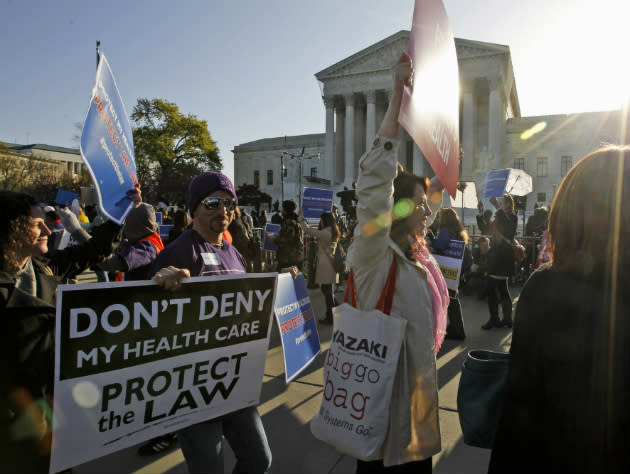 The Ticket
The TicketSupreme Court justices challenge Obama administration over health care law

With President Barack Obama's landmark health care law in the balance, the divided Supreme Court on Tuesday questioned whether the measure properly regulates commerce or overreaches the Constitution and allows Washington to improperly force Americans to eat their vegetables.
Justice Anthony Kennedy, whose questioning is closely watched because he represents a potential swing vote, posed several skeptical queries to the Obama administration's lawyer.
"Can you create commerce in order to regulate it?" he asked. "I understand we must presume laws are constitutional" until it is demonstrated otherwise, he told Solicitor General Donald Verrilli, representing the administration. But he said the administration has "a heavy burden of justification."
[Related: Can Obamacare survive without the individual mandate?]
Conservative Justice Antonin Scalia sharply questioned whether the Obama administration's requirement that Americans have health insurance or pay a penalty—the so-called "individual mandate" at the heart of the law—might mean that "therefore you (the government) can make people buy broccoli."
Verrilli told the court that the law regulated health insurance, the means of payment for health care, while "broccoli is not the means of payment for anything else."
"The market does not provide" affordable health insurance for some 40 million people, Verrilli declared in his opening argument. "The system does not work."
At the heart of the debate was whether the Constitution's so-called "Commerce Clause"—which gives Congress the power to regular interstate commerce—makes the Affordable Care Act constitutional.
Chief Justice John Roberts asked Verrilli whether Washington could compel cellphone purchases. Justice Samuel Alito wondered whether it could force Americans to buy insurance to pay for funeral costs.

"I think it's completely different," said Verrilli, arguing that when it comes to health care, those who don't buy it and get sick can get emergency room care, an expensive option effectively subsidized by their insurance-buying fellow citizens.
Verrilli said that this relationship means that people who don't buy insurance are effectively already in the market for health care.
When Alito said the mandate was essentially taking aim at non-insurance-buying Americans and "requiring them to subsidize" care for others, Justice Ruth Bader Ginsburg drily observed, "That's how insurance works."
[Audio: Supreme Court oral arguments on mandate]
Scalia and Roberts repeatedly warned that the case could result in Congress using the Commerce Clause to compel all kinds of behavior.
"If the government can do this, what is left? What else can it not do?" asked Scalia. "All bets are off," Roberts agreed.
Breyer countered that the government's case was in line with past assertions of powers under the Commerce Clause, and said that should "eliminate the broccoli possibility."
Former Solicitor General Paul Clement, now the attorney spearheading the legal assault on Obama's signature domestic policy achievement, described the monetary penalty imposed on those who do not buy insurance as an "impermissible" direct tax and warned that ruling that "Congress has the power to compel people into commerce" could "upend our basic federalist system."
The verbal fencing drew a heavyweight audience packed with lawmakers and top Obama aides.
Republican Senate Minority Leader Mitch McConnell, Republican Senators John Cornyn, John Barrasso, Charles Grassley and others were on hand. Democratic Senate Judiciary Committee Chairman Patrick Leahy was there, as was Democratic Senate Finance Committee Chairman Max Baucus, who played a central role in writing the law.
Reporters also spotted top Obama domestic policy adviser Valerie Jarrett and Attorney General Eric Holder.
More popular Yahoo! News stories:
• Supreme Court considers: Did health care challenge come too soon?
• The Supreme Court's health care reform case—What to expect?
